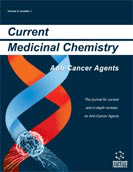Abstract
DNA topoisomerase is one of drug targets in cancer therapy. Camptothecin is a plant alkaloid derived from the Chinese tree Camptotheca acuminate. It has been demonstrated that the plant alkaloid camptothecin (CPT) and its analogs caused DNA damage by specifically targeting DNA topoisomerase, effectively devastating a broad spectrum of tumors. Although the anti-tumor activities of CPT and its analogs have been intensively studied for nearly fifty years, recent advances in drug delivery systems of CPT have considerably improved this drug’s efficiency and prevented drug resistance. However, CPT and its analogs showed extremely low water solubility, inactivation of carboxylate salt, undesired interaction with human serum albumin and short half-life, therefore, the development of new and effective CPT-derived products is ongoing. In this chapter, we will summarize the current status of CPT-derived anticancer drugs in literatures, patents and highlight their clinical application.
Keywords: Aminocamptothecin, anti-tumor efficacy, belotecan, bioavailability, Camptothecin, cancer, clinical trial, drug delivery system, irinotecan, liposomal camptothecin, micelles, nanomedicine, nanoparticles, 9-nitrocamptothecin, pharmaceutical dosage form, pharmacokinetics, poly(ethylene glyclol), polymeric therapeutics, serum stability, topoisomerase I inhibitor, topotecan, water solubility.






















